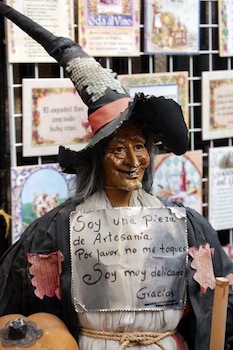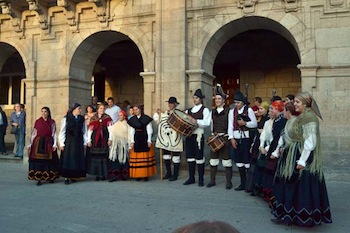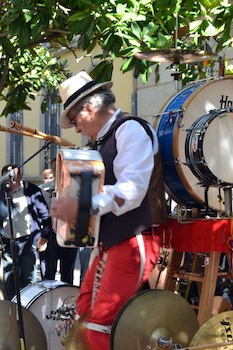By Elizabeth Varadan
 Every year, from October 4th through 12th, the San Froilán Fiesta lights up Lugo, the capital city of Lugo province in Galicia, the northwest region of Spain. Famous bands perform onstage. Puppeteers and street musicians rim plazas or spill along side streets. Artisans sell handcrafts on blankets. A silver cowboy statue springs to life. A witch guards a major shop on a corner. Another witch peers out a window.
Every year, from October 4th through 12th, the San Froilán Fiesta lights up Lugo, the capital city of Lugo province in Galicia, the northwest region of Spain. Famous bands perform onstage. Puppeteers and street musicians rim plazas or spill along side streets. Artisans sell handcrafts on blankets. A silver cowboy statue springs to life. A witch guards a major shop on a corner. Another witch peers out a window.
Witches? Isn’t this festival about a saint (San Froilán)?
Like all of Galicia, Lugo is steeped in Celtic and Roman Catholic history. Founded by Celts and dedicated to Lugos, God of Light, Galicia boasts a belief in meigas, benevolent witches with curative powers who watch over the land. If you want a vacation to get into a Halloween mood, Lugo is the place to go.
The Romans brought Christianity to Galicia. The Roman wall encircling the old town is considered a national monument. Though wide enough to drive a car on, the wall is reserved for walking only. Inside its 10 arches, cobbled streets lead to several plazas and churches. One of these, the Convent and Church of St. Francis, houses the Provincial Museum showing Galician history and art.
 The St. Mary’s Cathedral (or Lugo Cathedral) became a pilgrimage center in the Middle Ages. A chapel is dedicated to San Froilán, patron saint of both Lugo and Leon provinces. A ninth-century hermit and later a bishop, San Froilán founded monasteries in the early days of the reconquista, or re-Christianizing, of Spain.
The St. Mary’s Cathedral (or Lugo Cathedral) became a pilgrimage center in the Middle Ages. A chapel is dedicated to San Froilán, patron saint of both Lugo and Leon provinces. A ninth-century hermit and later a bishop, San Froilán founded monasteries in the early days of the reconquista, or re-Christianizing, of Spain.
The festival has three highlights: October 5th, the saint’s religious day; the following Sunday, dedicated to traditional Galician music and dance; and the eighth day, when plazas fill with a Medieval Fair.
The first visit my husband and I took coincided with the Medieval Fair. Artisans displayed traditional black pottery. Performers exhibited jousting and archery skills, and reenacted historical scenes. Stalls offered mead, honey, and pulpo (octopus). A falconer stood near his array of raptors -- falcons, hawks, eagles, and horned owls. In the evening, we were treated to a glittering acrobat show in the Plaza Mayor. And around 2:00 a.m., we watched a spectacular fireworks display from our hotel window.
On our most recent visit to Galicia (October 2012), we purposely went on the Sunday that celebrates traditional culture. Once unpacked, we headed out to stroll the plazas and browse various entertainments. On a side street, a man drew in crowds with his one-man band. Andean fusion music floated from one corner of the Plaza Mayor. Near the ayuntamiento (town hall), dancing groups performed folk dances. Little statues and dolls dressed like witches reminded us of Lugo’s (and Galicia’s) rich folklore.
 After lunch, we came upon a band rehearsing at the Plaza Santa Maria, playing Galician music with traditional instruments -- four harps, four Galician-style bagpipes (gaitos), four violins, six tambourines, one huge set of drums and a smaller drum, and about eight “lap” organs with handles, as well as castanets and a mouth instrument “twanged” by hand. The music sometimes sounded Irish, sometimes Greek, sometimes Spanish -- and always haunting. That night, we heard the concert all over again, with the orchestra members dressed in style.
After lunch, we came upon a band rehearsing at the Plaza Santa Maria, playing Galician music with traditional instruments -- four harps, four Galician-style bagpipes (gaitos), four violins, six tambourines, one huge set of drums and a smaller drum, and about eight “lap” organs with handles, as well as castanets and a mouth instrument “twanged” by hand. The music sometimes sounded Irish, sometimes Greek, sometimes Spanish -- and always haunting. That night, we heard the concert all over again, with the orchestra members dressed in style.
The day was topped off in the Plaza Mayor at a table outside one of the many cafés, where we sat until nearly midnight enjoying the dancing crowd and the orchestra onstage. The following morning, we indulged in a slice of Tarta de Santiago (a traditional Galician almond cake).
Like the almond tang of the cake, the San Froilán Fiesta lingers in our memories.
An interesting day trip 11 miles from Lugo:
Museo Arqueolóxico do Castro de Viladonga
27259 Castro de Rei
Lugo (province), Galicia
+34 982314255
museo.viladonga@xunta.es
Restaurants we enjoyed:
A Nosa Terra
San Eufrasio, 171
27295 Lugo, Spain
+34 982250834
A Tasca
Cruz, 3
24001 Lugo, Spain
982228718
A good hotel near the Plaza Mayor:
Hotel Méndez Núñez
Rua de Reiña 1
27001, Lugo, Galicia, Spain
1-866-599-6674
If you would like to purchase this article for your publication, please click here to contact the author directly.
 Every year, from October 4th through 12th, the San Froilán Fiesta lights up Lugo, the capital city of Lugo province in Galicia, the northwest region of Spain. Famous bands perform onstage. Puppeteers and street musicians rim plazas or spill along side streets. Artisans sell handcrafts on blankets. A silver cowboy statue springs to life. A witch guards a major shop on a corner. Another witch peers out a window.
Every year, from October 4th through 12th, the San Froilán Fiesta lights up Lugo, the capital city of Lugo province in Galicia, the northwest region of Spain. Famous bands perform onstage. Puppeteers and street musicians rim plazas or spill along side streets. Artisans sell handcrafts on blankets. A silver cowboy statue springs to life. A witch guards a major shop on a corner. Another witch peers out a window. Witches? Isn’t this festival about a saint (San Froilán)?
Like all of Galicia, Lugo is steeped in Celtic and Roman Catholic history. Founded by Celts and dedicated to Lugos, God of Light, Galicia boasts a belief in meigas, benevolent witches with curative powers who watch over the land. If you want a vacation to get into a Halloween mood, Lugo is the place to go.
The Romans brought Christianity to Galicia. The Roman wall encircling the old town is considered a national monument. Though wide enough to drive a car on, the wall is reserved for walking only. Inside its 10 arches, cobbled streets lead to several plazas and churches. One of these, the Convent and Church of St. Francis, houses the Provincial Museum showing Galician history and art.
 The St. Mary’s Cathedral (or Lugo Cathedral) became a pilgrimage center in the Middle Ages. A chapel is dedicated to San Froilán, patron saint of both Lugo and Leon provinces. A ninth-century hermit and later a bishop, San Froilán founded monasteries in the early days of the reconquista, or re-Christianizing, of Spain.
The St. Mary’s Cathedral (or Lugo Cathedral) became a pilgrimage center in the Middle Ages. A chapel is dedicated to San Froilán, patron saint of both Lugo and Leon provinces. A ninth-century hermit and later a bishop, San Froilán founded monasteries in the early days of the reconquista, or re-Christianizing, of Spain. The festival has three highlights: October 5th, the saint’s religious day; the following Sunday, dedicated to traditional Galician music and dance; and the eighth day, when plazas fill with a Medieval Fair.
The first visit my husband and I took coincided with the Medieval Fair. Artisans displayed traditional black pottery. Performers exhibited jousting and archery skills, and reenacted historical scenes. Stalls offered mead, honey, and pulpo (octopus). A falconer stood near his array of raptors -- falcons, hawks, eagles, and horned owls. In the evening, we were treated to a glittering acrobat show in the Plaza Mayor. And around 2:00 a.m., we watched a spectacular fireworks display from our hotel window.
On our most recent visit to Galicia (October 2012), we purposely went on the Sunday that celebrates traditional culture. Once unpacked, we headed out to stroll the plazas and browse various entertainments. On a side street, a man drew in crowds with his one-man band. Andean fusion music floated from one corner of the Plaza Mayor. Near the ayuntamiento (town hall), dancing groups performed folk dances. Little statues and dolls dressed like witches reminded us of Lugo’s (and Galicia’s) rich folklore.
 After lunch, we came upon a band rehearsing at the Plaza Santa Maria, playing Galician music with traditional instruments -- four harps, four Galician-style bagpipes (gaitos), four violins, six tambourines, one huge set of drums and a smaller drum, and about eight “lap” organs with handles, as well as castanets and a mouth instrument “twanged” by hand. The music sometimes sounded Irish, sometimes Greek, sometimes Spanish -- and always haunting. That night, we heard the concert all over again, with the orchestra members dressed in style.
After lunch, we came upon a band rehearsing at the Plaza Santa Maria, playing Galician music with traditional instruments -- four harps, four Galician-style bagpipes (gaitos), four violins, six tambourines, one huge set of drums and a smaller drum, and about eight “lap” organs with handles, as well as castanets and a mouth instrument “twanged” by hand. The music sometimes sounded Irish, sometimes Greek, sometimes Spanish -- and always haunting. That night, we heard the concert all over again, with the orchestra members dressed in style.The day was topped off in the Plaza Mayor at a table outside one of the many cafés, where we sat until nearly midnight enjoying the dancing crowd and the orchestra onstage. The following morning, we indulged in a slice of Tarta de Santiago (a traditional Galician almond cake).
Like the almond tang of the cake, the San Froilán Fiesta lingers in our memories.
An interesting day trip 11 miles from Lugo:
Museo Arqueolóxico do Castro de Viladonga
27259 Castro de Rei
Lugo (province), Galicia
+34 982314255
museo.viladonga@xunta.es
Restaurants we enjoyed:
A Nosa Terra
San Eufrasio, 171
27295 Lugo, Spain
+34 982250834
A Tasca
Cruz, 3
24001 Lugo, Spain
982228718
A good hotel near the Plaza Mayor:
Hotel Méndez Núñez
Rua de Reiña 1
27001, Lugo, Galicia, Spain
1-866-599-6674
If you would like to purchase this article for your publication, please click here to contact the author directly.